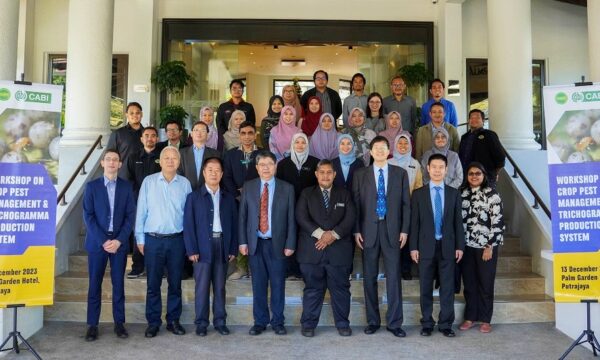
CABI has joined forces with the East African Community (EAC) Secretariat to hold a horizon scanning workshop in Tanzania to train Partner States on the identification and mitigation of priority crop pests which threaten livelihoods and food security.
Scientists from CABI’s regional centre for Africa in Nairobi, Kenya, took part in the workshop to highlight how horizon scanning can search for potential pest invasions and assess their potential socio-economic and biodiversity impacts and ways to mitigate them.
Mr Jean Baptiste Havugimana, the Director of Productive Sectors, in EAC Secretariat who said that to effectively monitor pest threats to EAC region will help with pest risk management interventions thereby protecting EAC’s food security and regional trade from these potential threats.
Comprehensively scans scientific literature to enlist plant pests
These include, he said, solutions like CABI’s Horizon Scanning Tool that comprehensively scans scientific literature to enlist plant pests that are absent in each area but need the attention of decision-makers to help smallholder farmers protect their crops and livelihoods.
Mr. Havugimana said that the EAC Secretariat organized a regional validation workshop of Partner States to validate previously concluded Pest Risk Analysis (PRAs) on bananas, cassava and sorghum.
It was recommended that there is need to undertake horizon scanning to identify pests of concern to the EAC region and prioritize them for regional PRAs and interventions that will ensure robust plant health.
CABI, through its global PlantwisePlus programme and together with the EAC Secretariat, are working to identify and prioritize pests of concern to the region.
Focus will be on pests that are not reported in East Africa
The EAC PRA Technical Working Group using the CABI Horizon Scanning tool, will focus on pests that are not reported from East Africa and develop a Pest Risk Register for the EAC to support pest risk monitoring. Recently, CABI has supported horizon scanning studies in Burundi, Kenya, Rwanda and Uganda National Plant Protection Officers.

Dr MaryLucy Oronje, SPS Scientist at CABI, said, “The EAC is one of the fastest-growing regional economies – with agricultural playing a major part. But the trade of agriculture between EAC partner states is hindered by issues including plant pests which in turn impinge upon necessary sanitary and phytosanitary (SPS) standards.
“The training is a first step in developing a list of priority pests that may become serious threats to agriculture in the EAC regions and to introduce the concept of a Pest Risk Monitoring to keep focus on any changes to risk for the priority pests.”

The recent USDA-supported ‘Increasing safe and efficient trade of agriculture in East Africa’ (TRASE) project, implemented by Land O’Lakes Venture 37 (V37), and which assessed SPS systems across the EAC, and investment opportunities, and the FAO Southeastern Africa project that established the Baseline on Early Warning, Preparedness and Response System, identified the need to capacity build EAC partner States pest preparedness and response.
Additional information
Main image: horizon scanning workshop in Tanzania to help train partner states on the identification and mitigation of priority crop pests which may threaten livelihoods and food security (Credit: CABI).
Relevant stories
‘Working in partnership to increase safe and efficient trade of agriculture in East Africa.’
Baseline survey on emerging plant pests in Eastern Africa – Programme support to the establishment of the Eastern African Emerging Pests Programme on Early Warning, Preparedness and Response System. Addis Ababa https://doi.org/10.4060/cc2751en
Related News & Blogs
Biosecurity and skills development workshop brings together key players in Africa’s plant health ecosystem
CABI has convened a plant biosecurity training and skills development workshop bringing together key players in Africa’s plant health ecosystem keen to help the continent’s smallholder farmers improve their livelihoods and food security. The workshop w…
23 June 2025




